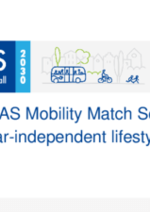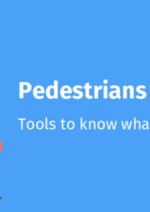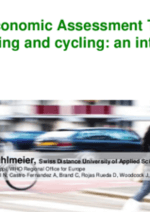Fostering walking and cycling: CIVITAS Mobility Match session #1 explores living car-free

Image by Unsplash, Gabriella Clare Marino
The CIVITAS Mobility Match Session series kicked-off on 30 September 2021, with its first session focusing on car-independent lifestyles.
During the event, participants were introduced to three useful tools for fostering cycling and walking in cities by tool developers directly. The three tools were narrowed down from a larger pool of tools found on the CIVITAS Tool Inventory.
First, the Pedestrians First Toolkit. Used for talking about and planning walkability in cities, the toolkit is comprised of four separate tools that can be used to: (1) View city measurements, (2) Measure inclusive transit, (3) Examine a neighbourhood, and (4) Visit a street. The latter three of the tools allow individuals to go out into their cities and measure how walkable their streets are, while the View City Measurement tool comes with data (for cities greater than 500,000 inhabitants in size) to measure key indicators of walkability.
The Pedestrians First Toolkit was introduced by D. Taylor Reich, a Research Associate at the Institute for Transportation & Development Policy. To access the Toolkit and read reviews, visit the website.
Second, the Bike Citizens App. Developed with the goal of contributing to a shift away from cars towards cycling, the app is used to help cyclists navigate through their cities and as a resource for local authorities to become better acquainted with cycling practices. The App offers access to a variety of services, including Ping if you care!, a digital campaign that allows cyclists to pinpoint unsafe spots using an attachable Bluetooth button.
The Bike Citizens App was introduced by Tom Rath, Director of Digital Business at Bike Citizens Mobile Solutions GmbH. For access to the App and to learn more about better cycling planning and management, visit the website.
Third, the Health Economic Assessment Tool (HEAT). Designed for transport planners in search of evidence of the health benefits of walking and cycling, HEAT assesses both current and past levels of cycling and walking, changes over time, as well as proposed projects. The design of the tool allows users to access it with minimal data inputs, meaning that it is widely accessible to all cities – even those with little prior walking or cycling data.
HEAT was introduced by Dr. Sonja Kahlmeier, Head of the Department of Health at the Swiss Distance University of Applied Sciences. The most recent version of the tool was launched in late 2021.
Participants in the workshop explored these three car-independent lifestyles-related tools via an interactive exercise that used Mural Whiteboard, on which they shared their thoughts on the advantages and potential challenges linked to using each of the tools.
For more information, be sure to check out the presentations, Mural responses, and session recording below.
Author: Elma Meskovic
Resources
Multimedia Library
This is recommended related external content and can be viewed by clicking on it. By clicking you consent to the display of external content. This enables personal data to be transmitted to third-party platforms.
Read more about our privacy policy.










